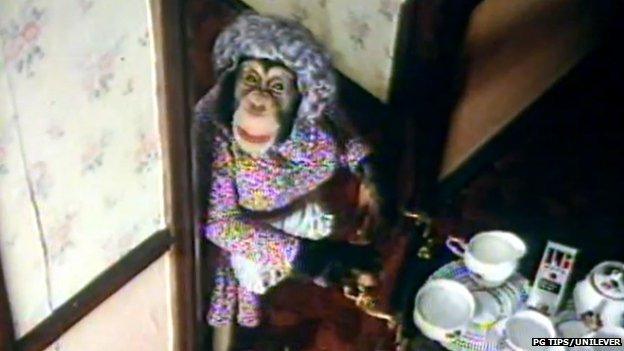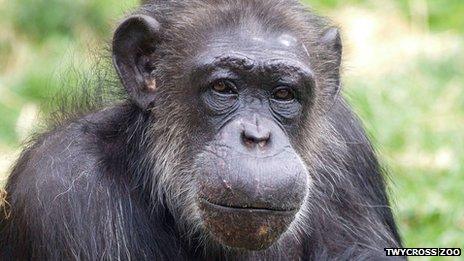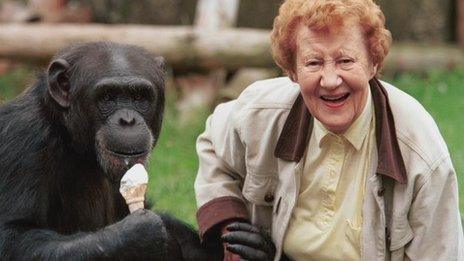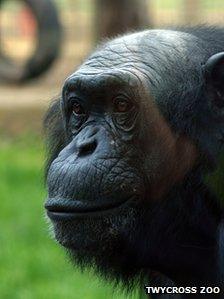PG Tips chimps: The last of the tea-advertising apes
- Published

A freeze frame of Choppers playing Ada in one of the PG Tips adverts. Twycross Zoo said chimps that spent too much time in the human world suffered long-term damage
The PG Tips chimps were loved by the public and helped make the tea brand one of the UK's most popular. But while the nation laughed, were the animals' lives being damaged?
Choppers the chimpanzee - the last surviving star of the TV ads - has only recently started taking part in grooming sessions, an important ape behaviour.
But for years she shunned her own kind, preferring the company of human beings.
The chimpanzees, trained by Twycross Zoo, in Leicestershire, were dressed up in clothes and lip-synced with the voices of actors like Peter Sellers and Bob Monkhouse.
They also appeared in children's shows Tiswas and Blue Peter, and visitors flocked to see their infamous, messy tea parties.
According to the zoo, 42-year-old Choppers is the last surviving PG Tips chimp after her co-habitant Louis died in their Twycross enclosure in July.
Louis was the star of one of the more memorable PG Tips adverts - when two chimpanzee removal men tried to get a piano down a flight of stairs.

Choppers is still learning how to be a chimpanzee, according to Twycross Zoo
He played the bowler hat-wearing Mr Shifter and the advert's punchline went: "Dad, do you know the piano's on my foot?" "You hum it, son, I'll play it!"
The zoo, which benefitted from revenue raised from the PG Tips ads, has since said the use of the apes was wrong and has now highlighted the damage it caused the animals in later life.
Choppers, who played Ada in the commercials, is still, in old age, learning how to be a chimpanzee.
Her insularity and unwillingness to integrate with other chimps was caused by the close bonds she formed with people, according to Sharon Redrobe, Twycross Zoo's chief executive.
"She's mixed up," said Ms Redrobe.
"It's not a good start in life to be treated like a human because they don't learn ape behaviour and are not very good at being with other chimps.
"They want to be with people."
Dr Charlotte Macdonald, the zoo's head of life sciences, said the fact Louis and Choppers lived so long as a pair was a clear sign things were not right.
"Chimpanzees are group living animals," said Ms Macdonald.
"But [Louis and Choppers] were very focussed on humans, more than they should be.
"They would recognise regular visitors and effectively come over and say hello.
"Chimps should ignore you."
Ms Macdonald said the two apes also misunderstood members of their own species.
A chimpanzee might offer his or her hand, or pout, in an act of friendship, but the PG Tips chimps failed to understand non-verbal communication, according to the zoologist.
She said they would get nervous, or run away and in some cases become aggressive.
However, the death of Louis has inadvertently helped Choppers relate to other chimps because he is not around anymore to provide support.
"She's integrating nicely in her twilight years," said Ms Redrobe.
"She took part in a grooming circle the other day, which is absolutely brilliant."
Riding bicycles
Sharon Redrobe's leadership of the zoo is very different from that of Molly Badham, who co-founded the park in 1963.
Ms Badham, who died in 2007, had owned a zoological collection since 1954 and was as much a celebrity as the chimps, often appearing with the animals on TV.
She told the BBC in 2003 the apes enjoyed dressing up for their television work.
Ms Badham said: "They were very proud of their clothes… I remember one wanted to wear the shoes it had all the time.
"Another could pour tea without spilling it. And they loved riding bicycles. Tea parties used to be a highlight both for the chimps and visitors to the zoo."
However, Ms Badham was aware how these activities became frowned upon.
She said: "Attitudes have changed now about what you do with animals. But I do know my chimps loved it."
The zoo now actively promotes conservation - it is also known as the World Primate Centre - and the animals' enclosures are matched as closely as possible to wild habitats.
"You can't deny the past - it happened," said Sharon Redrobe. "It absolutely wouldn't happen again under my leadership.
"It was of its time and it makes me cringe to see it, but people at the time didn't know any better."
Ms Macdonald said there was no question the animals were ever treated badly and recently studied some old footage of the PG Tips apes in action.
"They were having a ball," she said. "They were juveniles and so very curious. They were enjoying themselves and having fun."
Ms Redrobe supports this view and said she could not deny that in the moment of dressing up, or getting covered in cake during a tea party, the animals were having a good time.
However, the problem come later when they enter adulthood, and became potentially harmful to human beings.

Molly Badham co-founded Twycross and trained the chimps for TV work
She said: "They hit adolescence and have a huge growth spurt and then have the potential to become aggressive."
Dr Macdonald said chimps could be five or six times stronger than human beings.
As chimpanzees have a social hierarchy, if they are participating in a human world they could easily challenge a person, with possibly fatal consequences.
Ms Redrobe added: "At some point you're going to have to put them in a cage.
"They suffer at that moment when you can't have contact with them anymore because they are too dangerous.
"They'll have a stressful year or two when they miss you and miss dressing up."
The use of chimps in advertising can also perpetuate the problem they face in the wild, according to ape expert Ian Redmond.
He chairs the Ape Alliance, a coalition of organisations and individuals that work for the welfare of the endangered animals.
He said: "The wonder and curiosity of chimpanzees can lead to the commodification of them - apes make money."
Mr Redmond claims that when the public see the animals on TV, in entertainment or advertising, they find it hard to believe they are actually a species facing extinction.
He said this makes it seem acceptable for some to take young apes from the wild, which are then sold for television work, or even kept as exotic pets.
He added: "Adverts and films perpetuate this belief and filmmakers need to consider the consequences of their actions."
'Fascinating creatures'
The adverts are remembered fondly by the public and often appear in polls of all-time favourite commercials.

Louis, who died in July, played Mr Shifter in one advert
Ms Redrobe said people should not feel bad for having enjoyed them.
She said: "[Chimps are] fascinating creatures but people have to appreciate that they're amazing in their own enclosure rather than being dressed up.
"But it's interesting that the sort of people who liked chimp tea party-type adverts don't like seeing them in cages.
"It's much better for them to be with other chimps."
Robert Opie, director of the Museum of Brands, Packaging and Advertising, said using the chimps made PG Tips very successful.
He said: "People remember them with great affection but times move on and we have to move with it.
"Animals are used because they're emotive and cuddly [and] they can still be used as they connect the public to the product.
"We learn as we progress [and] we should be aware what effect it has on the animals, it's all part of history and learning.
"Best to leave chimps to be chimps."
Unilever, which owns PG Tips, declined to comment.
- Published11 July 2013